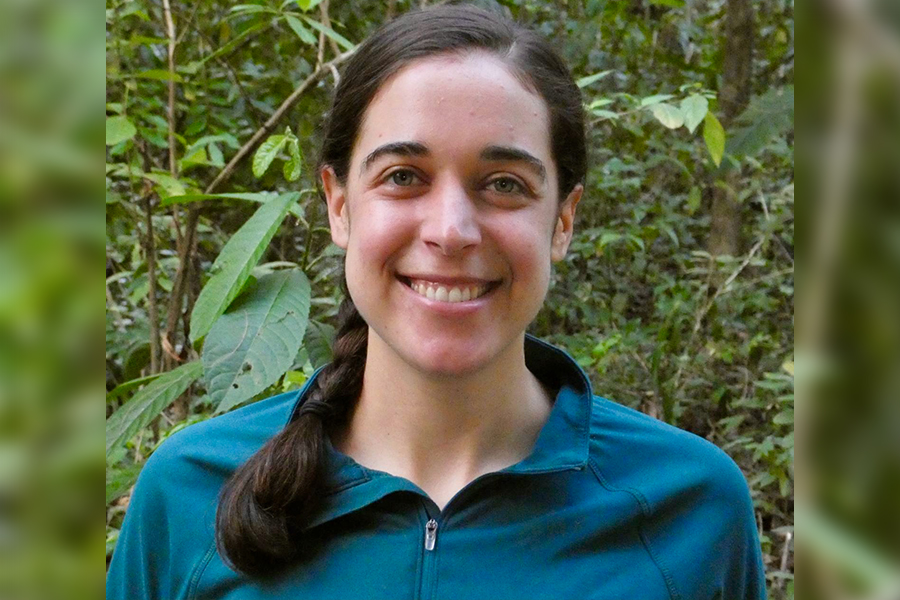Student Spotlight: Pearl Rivers

Pearl Rivers is a doctoral student pursuing a degree in biological science in Florida State University’s Department of Biological Science, part of the College of Arts and Sciences. Rivers received her bachelor’s degree in biology from Oberlin College, in Ohio, in 2014. After graduating, she traveled to gain field experience before applying to graduate school. Rivers has been part of research projects studying dancing birds in Panama, seed dispersal networks in Hawaii, cooperation in meerkat communities in South Africa, and endangered loggerhead shrikes, a species of medium-sized birds, in California.
What year are you in school, and when do you expect to graduate?
I am a doctoral candidate finishing up my sixth year, and I will defend my dissertation and graduate this fall.
Tell us a little about your background, where you’re from and what brought you to FSU.
I grew up in the California Central Valley where I loved running and biology. Those interests led me to Oberlin College where I ran cross country and completed my bachelor’s degree in biology. After graduating, I spent three years traveling and gaining research experience on projects studying animal behavior. I eventually felt prepared to pursue a graduate degree.
What inspired you to pursue a degree in biological science?
I chose to pursue my doctorate at FSU because I wanted the opportunity to work with an adviser I knew would support my research, career and life goals. After graduating from Oberlin College, I was somewhat lost — I had no clear idea of what the next steps were for pursuing a career in animal behavior research. I applied for field research jobs and was hired for a field season in Panama working with assistant professor of biological science Emily DuVal on her long-term research investigating the behavioral ecology of lance-tailed manakins, a small neotropical bird species.
I thoroughly enjoyed the field season even though the conditions were physically tiring. The work was fascinating and rewarding, and I found an academic mentor in Dr. DuVal. With her encouragement, I thought more seriously about graduate school and eventually applied to FSU. At FSU, I have benefited immensely from a collaborative department that has prepared me for the rest of my career in ecology and evolutionary biology.
What do you want the public to know about your research? Why are your topics important?
Many organisms, from humans to bacteria, exhibit mate choice, which is when individuals evaluate potential mates and are predisposed to choose some over others. Mate choice is a complex and important force in nature that can drive the evolution of elaborate male traits such as dramatically colored plumage and complex song in male birds. A fundamental puzzle in mate choice research is explaining the maintenance of genetic variation when females have strong and consistent preferences for male traits.
Using lance-tailed manakins as a study system, my dissertation research investigates two possible answers to this puzzle: First, variation in female mate choice over time, and second, female choice for diversity in immune system genes. Male lance-tailed manakins are brightly colored and perform complex dance displays for choosy females, but females may also use more subtle scent cues to assess males when choosing a mate. By examining variation in mate choice in relation to poorly understood sensory systems and across long time scales, my research will improve my field’s understanding of the variation in mate choice and its effects on the evolution of elaborate secondary sexual traits.
Tell us a bit about your experience with the DuVal Lab. What is your role within the lab? What does your typical day look like in the lab?
Most of the research in the DuVal Lab focuses on the behavior of the lance-tailed manakin. We study these fascinating birds on an island off the coast of Panama. I spent three to four months per year at the field site for the first five years of my doctoral degree. During a typical day in the field, we are out working by 7 a.m. We spend the day hiking around the field site doing behavioral observations at male manakin display areas and searching for nests. After we finish working around 5 p.m., we cook dinner, take care of chores, and enter data from the day. In a typical day at FSU, I process videos from the field, do lab work and write papers.
What has been the most surprising thing you have learned through your research?
Wild animals do not always behave how you expect them to behave. You can plan the perfect experiment, but the study subjects do not always cooperate with your plans. However, there is still much to learn from this variation in behavior.
What aspect of your areas of study do you find most rewarding?
Field work has been my favorite part of my doctoral studies. Spending all day hiking around the field site and seeing some fascinating animal behavior is incredibly rewarding.
What on-campus resources have helped you achieve success?
Having access to exercise classes and facilities at the Bobby E. Leach Student Recreation Center has been important for my mental and physical well-being.
Are there any faculty or staff who have helped or inspired you?
The Department of Biological Science faculty and staff are all kind and helpful. Administrative support assistant Jen Kennedy has been immensely helpful in navigating the complexities of grant-funded travel.
Following your graduation, what are your plans? Even though you might miss FSU, what are you looking forward to once you graduate?
After I defend my dissertation and graduate this fall, my plan is to work for the U.S. Fish and Wildlife Service where I can use the skills I have learned at FSU to help study and conserve U.S. bird species. I am excited to move back west to be closer to family and live in a drier climate, though I will miss FSU and all the parks in and around the city.
